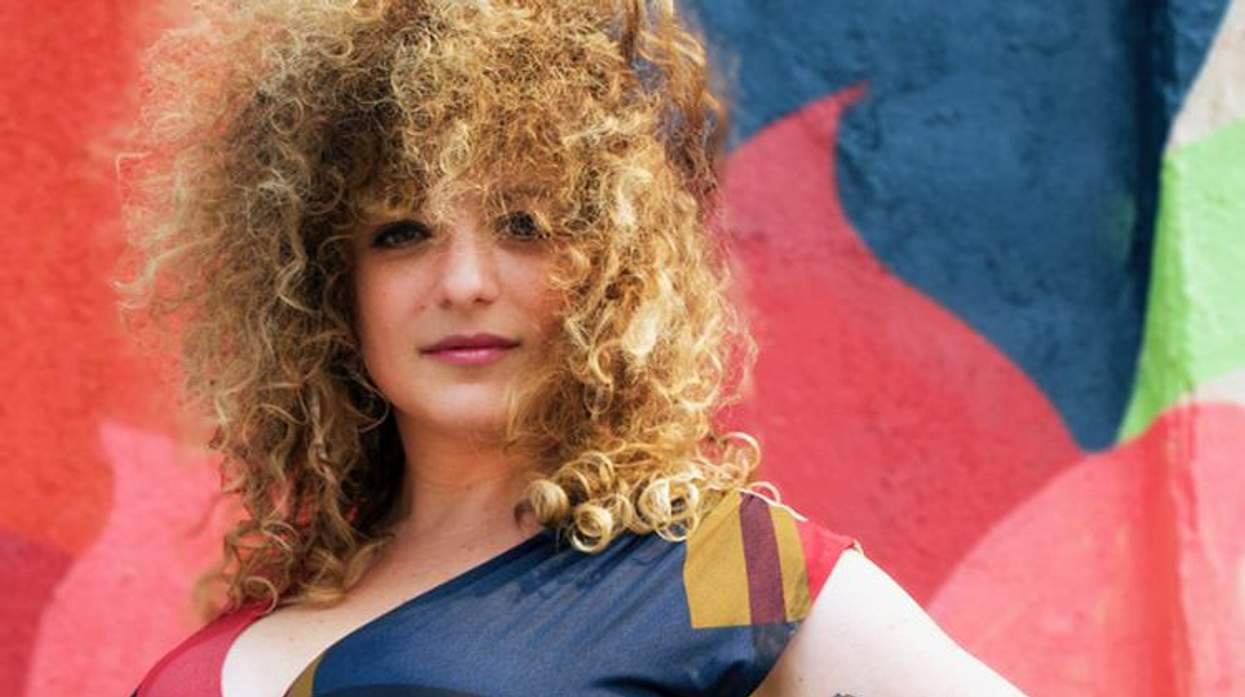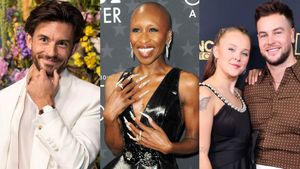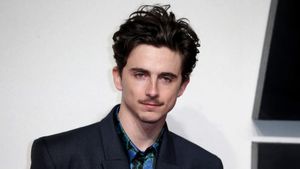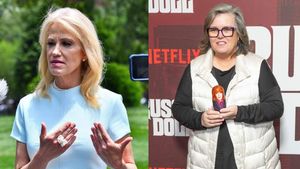Eight weeks out from the 2018 midterm election, it feels like the stakes have never been higher -- particularly for LGBTQ citizens, as issues like "religious freedom" and gender identity become explosive talking points for candidates fighting for control of the House and Senate. With a recent poll suggesting that only 28 percent of young voters are certain they'll turn out to vote, it's easy to feel anxious about the results.
To counter that anxiety, we're highlighting people who are doing something about it: rising stars in the queer community who are using their influence and fan followings to raise awareness, get people involved, and get out the vote on November 6.
First in our weekly interview series is bisexual writer and comedian Sara Benincasa, whose raunchy commentary on social media has added some much-needed laughs to a relentless news cycle. The Los-Angeles-by-way-of-New-Jersey entertainer spoke to The Advocate about local activism, candidates who inspire her, and why a little human connection can go a long way.
The Advocate: In your essays and social media posts, you often encourage people to take care of themselves and be present in their community. Is that a way to cope with the current political situation?
Benincasa: One really wonderful way to deal with the anxiety, the stress, the fear, and the sadness of having a president and an administration that is so anti-diversity, anti-inclusion, and anti-progressive values is to do a good job in your own community -- to take care of your own, but to expand your notion of what your own means. Part of what's really hard to see with this administration and with the people that support it is that their notion of their own, their community, is rather small and narrow.
The ideal for an inclusive society, for a diverse society, is that you care very much about people who aren't related to you, who don't look like you, who don't necessarily speak the same language as you or have the same ethnic/religious/social background. One way to do that is right at home in your own geographic community, your city or your town. To volunteer, to look out for others, or donate a little bit of money where you can to people in need.
There are a lot of conflicting media messages about how to get more people engaged in politics. What are some of the main misconceptions that people have about this generation of potential voters?
There is a notion that half the country supports Trump. That's not true -- that's never been true. He didn't win the popular vote, Hillary Clinton won the popular vote. And that doesn't mean half the country supported her, it just means that over half the voters voted for her. [Trump's election] doesn't mean that half of the people you see out and about are anti-LGBTQA or anti-reproductive rights or anti-diversity or racist.
Obviously there are people who support him plenty, and there are younger people who support him as well. However, younger people do tend to lean more progressive, and I think that's important.
I also think that young people are going to turn out in higher numbers for the midterms then we've seen for previous midterm elections. A lot of young people are really passionate, and this shit matters to them. Especially people much younger than me, who have seen the ill effects of lawmakers who are fully in the pocket of the National Rifle Association. [They] are able to remember what it's like to be in high school and have real vivid empathy with kids who are suffering after shootings and violence in schools across the country. There are also a lot of young people who are deeply concerned about the kind of violence that overwhelmingly affects people of color.
What do politicians need to do to evolve with this new generation of voters?
What they need to do is certainly get together with young people in person, but also understand that it's important to be available to people online. I'm heartened when I see politicians who are very present and understand the social media platforms that younger people use.
Let me just say, it's always a mistake if you're an older person who's trying to sound cool. That's just always going to be a dorky bad move. What young people seem to value is authenticity. It's hard to expect a politician to be authentic all the time, since part of what they've chosen to do for a career is shovel bullshit -- you know, shake hands and kiss babies -- but I think that young people find politicians really appealing when the politician seems to be authentic.
And it's not like young people are automatically only excited about younger politicians. You saw in the last election a lot of people excited about Hillary Clinton and Bernie Sanders, both of whom are older people. The key here is not the age of the candidate, it's that they really seem to care and they have the courage of their convictions. That they display actual human emotion, whether that's anger, sorrow, joy.
Are there any specific candidates inspiring you at the moment?
I think that [Wisconsin congressional candidate] Randy Bryce is great. He's a really exciting candidate, because he's somebody who walks the talk. He's somebody who comes from the community where he's running and has dealt with a lot of the issues we're talking about. And there's nothing wrong with being a career politician, but there's something to be said for people who have had other careers, done other things.
What excites me a lot is seeing first-time candidates who never thought they would run for office, especially progressive women candidates of color. People who've been motivated to run because they felt that they had to, or out of real world concern for their kids, for their friends, for their nieces and nephews.
It's really cool that [Connecticut congressional candidate] Jahana Hayes is a candidate. Among the many other great things about her, she was the 2016 National Teacher of the Year. I was a high school teacher in my first career and I've got a master's degree from Columbia in teaching English for grades 7-12, so I'm always excited when I see teachers out there.
Look, if a racist, sexist, misogynist, entitled trust fund baby and reality game show host can be elected president, why shouldn't other people with no real political experience be able to run? Actual good people, kind people?
What other message would you give to your followers?
I understand the need to take a break from looking at it all and paying attention. That's OK. It's really important to take care of yourself, and it's really important to choose your goals and to choose the ways in which you can do service. You can't fix it all; nobody can.
But what we can do is do good things a little bit at a time. Do one small good thing in your community every week or even every month. Just make it a regular thing you can commit to, a form of service. Even if you can give $5 a month to a cause you care about, that will probably ameliorate some of your pain and your worry. It will also help other people out there in the world, and it will improve your mood, it'll improve other people's mood. It's just a good thing.
SARA BENINCASA is a stand-up comedian, actress, and the author of books like Real Artists Have Day Jobs, Agorafabulous!: Dispatches From My Bedroom, and Tim Kaine Is Your Nice Dad. You can follow her on Twitter and Instagram and read her essays on Medium.




































































Charlie Kirk DID say stoning gay people was the 'perfect law' — and these other heinous quotes